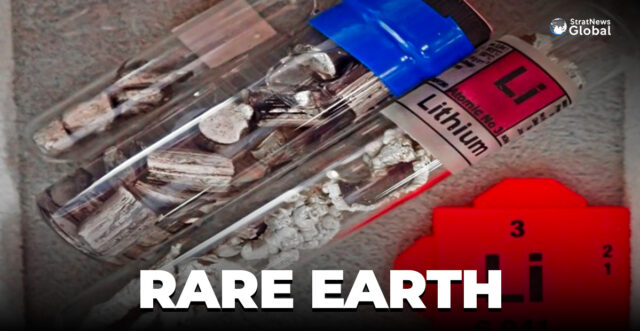Tensions between the United States and Ukraine have reached a new peak, not over military aid or geopolitical strategies, but over the control of Ukraine’s vast reserves of rare minerals.
Reports suggest that the U.S. might cut Ukraine’s access to Elon Musk’s Starlink internet services after Ukrainian President Volodymyr Zelenskyy rejected a U.S. proposal granting American firms 50% ownership of Ukraine’s critical minerals. These minerals, including graphite, uranium, titanium, and lithium, are indispensable for modern technologies, especially electric vehicle batteries.
The dispute reportedly began when U.S. Treasury Secretary Scott Bessent presented Zelenskyy with a proposal in February 2024, seeking 50% ownership of Ukraine’s critical minerals as compensation for U.S. wartime aid.
U.S. President Donald Trump has further fuelled tensions, denouncing Zelenskyy as “a dictator without elections” and demanding $500 billion worth of Ukrainian mineral wealth to pay for Washington’s support during the ongoing conflict with Russia.
Zelenskyy refused to sign the agreement, citing the lack of security guarantees for Ukraine. His government has since worked on a counter-proposal that includes explicit defence commitments alongside any mineral-related agreement. However, the U.S. appears unwilling to meet these conditions, raising questions about future military and economic support for Ukraine.
Ukraine sits on an estimated 2.6 billion tons of rare earth minerals and critical metals, with a potential market value of up to $11.5 trillion, according to the Ukrainian Geological Survey.
While the term “rare earth” refers to a group of 17 chemically similar elements essential for high-tech devices, Ukraine’s mineral wealth extends beyond rare earths to include uranium, tantalum, beryllium, niobium, graphite, titanium, and lithium.
- Lithium: A key component of rechargeable batteries for electric vehicles (EVs), smartphones, and laptops. Ukraine’s lithium reserves are among the largest in Europe.
- Titanium: Used in aerospace, defence, and medical industries for its strength and corrosion resistance.
- Graphite: Crucial for EV batteries, lubricants, and industrial applications.
- Uranium: Essential for nuclear energy production and defence purposes.
These resources are not just economically valuable but strategically critical, especially as the world transitions to greener technologies and energy independence. The U.S. currently relies heavily on China for rare earth minerals, making Ukraine’s reserves an attractive alternative amid rising tensions with Beijing.
The U.S. has long sought to diversify its supply chain for critical minerals to reduce dependence on China, which dominates the global rare earth market. In recent years, the Pentagon has invested millions in developing domestic supply chains, but progress has been slow. Ukraine’s reserves offer a potential solution, albeit one complicated by ongoing conflict and political instability.
For the U.S., securing access to Ukraine’s minerals would not only bolster its supply chain but also ensure strategic leverage in negotiations with both Russia and China. It would also support the American electric vehicle industry, which depends on stable supplies of lithium, graphite, and other battery-related materials.
However, Ukraine’s refusal to concede ownership of half its mineral wealth without security guarantees has frustrated Washington. Trump’s transactional approach to foreign policy, emphasizing economic returns over traditional alliances, has further complicated negotiations.
While Ukraine’s mineral wealth is vast, its exploitation faces significant hurdles:
- Outdated Surveys: Much of Ukraine’s geological data dates back to the Soviet era, with limited modern assessments of the commercial viability of its rare earth deposits.
- War Damage: The ongoing conflict with Russia has devastated Ukraine’s infrastructure, including its energy grid. Mining is an energy-intensive industry, requiring reliable power sources.
- Security Risks: Long-term mining investments require stability. With the war showing no signs of abating, foreign investors remain wary of committing significant capital.
It typically takes 18 years and up to $1 billion to develop a new mine and processing facility. Given Ukraine’s current instability, the timeline for realizing the economic potential of these minerals remains uncertain.
The minerals dispute has strained relations between Kyiv and Washington, with potential consequences for Ukraine’s war effort.
Starlink, provided by Elon Musk’s SpaceX, has been crucial for Ukrainian military communications since Russia’s 2022 invasion. Musk previously restricted access to Starlink during the fall of 2022, citing disagreements with Kyiv’s military strategies.
If the U.S. were to cut Ukraine’s access now, it could significantly hamper Ukraine’s battlefield communication and coordination, particularly for its drone operations, a key pillar of its military strategy.
Trump’s administration has made it clear that continued U.S. support, both military and economic, hinges on Ukraine’s willingness to share its strategic resources. Some Ukrainian officials have urged Zelenskyy to reconsider the deal to avoid further rifts with Washington. Others argue that signing away half the nation’s mineral wealth without solid security guarantees would undermine Ukraine’s sovereignty and economic future.
These sharp differences over Ukraine’s critical minerals underscore the increasingly transactional nature of international relations. For the U.S., access to these resources would bolster its technological and strategic independence from China. For Ukraine, however, the minerals represent not just economic value but a potential bargaining chip for long-term security guarantees.
As negotiations continue behind closed doors, the outcome will likely shape not only U.S.-Ukraine relations but also the broader geopolitical landscape. Should the two sides fail to reach a compromise, Ukraine risks losing not only crucial military support but also access to essential communication infrastructure like Starlink—a significant blow amid its ongoing war with Russia.
In a career spanning three decades and counting, Ramananda (Ram to his friends) has been the foreign editor of The Telegraph, Outlook Magazine and the New Indian Express. He helped set up rediff.com’s editorial operations in San Jose and New York, helmed sify.com, and was the founder editor of India.com.
His work has featured in national and international publications like the Al Jazeera Centre for Studies, Global Times and Ashahi Shimbun. But his one constant over all these years, he says, has been the attempt to understand rising India’s place in the world.
He can rustle up a mean salad, his oil-less pepper chicken is to die for, and all it takes is some beer and rhythm and blues to rock his soul.
Talk to him about foreign and strategic affairs, media, South Asia, China, and of course India.





